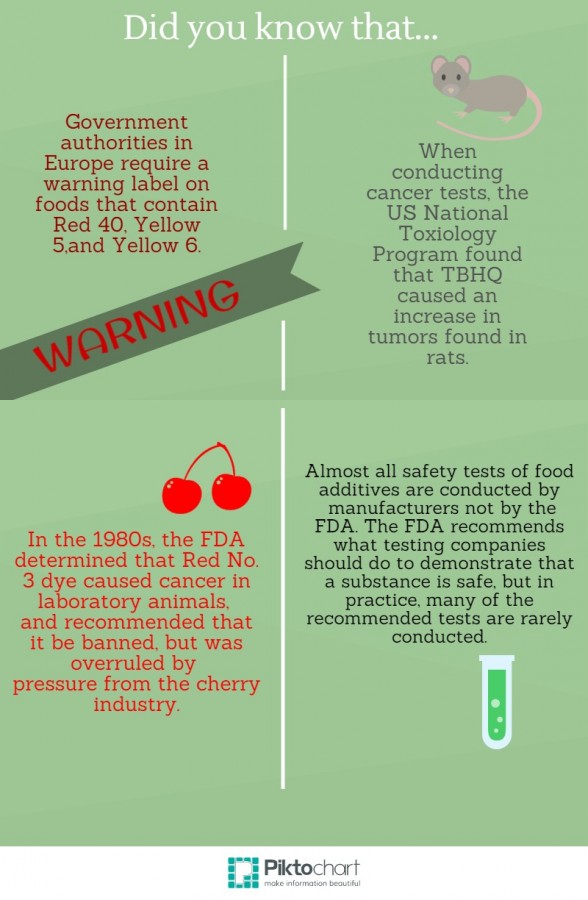MCPS to remove chemical additives from cafe food
November 21, 2014
MCPS Division of Food and Nutrition Services is working to remove a number of dangerous chemical additives and food dyes from food served in cafeterias after receiving a petition this summer from Real Food for Kids Montgomery (RFKM).
These additives and dyes include dyes Yellow 5 and 6, Tert-Butylhydroquione (TBHQ) and artificial sweeteners such as aspartame. RFKM proposed the banning of these additives because they are either mainly used in unhealthy foods and are substitutes for nutritious ingredients, cause a reaction in people sensitive to them or pose a risk of cancer or other adverse effects.
“There is a lot of documentation and research around these chemicals and the various risks and side effects,” RFKM co-director Karen Devitt said. “Some are carcinogenic, some effect behavior, [and] some exacerbate asthma.”
The Center of Science in Public Interest (CSPI) also contributed to this decision as the executive director Michael Jacobsen sent a letter to the school board about the harm these additives and dyes can cause.
According to a letter from Jacobsen, executive director of the (CSPI), almost all safety testing of food additives is conducted by manufacturers themselves and not the FDA. While the FDA recommends what testing should be done to demonstrate that a substance is safe, many of the recommended tests are rarely conducted.
RFKM argues that this should be a concern to all MCPS parents because these substances may cause hyperactivity in children who may be sensitive to them, therefore affecting children’s entire classroom environment.
According to the FDA, the behavior of certain children with ADHD may worsen if their diet contains too many of these substances, specifically artificial food colors.
“For kids who have ADHD the removal of food dyes from their diet has been shown to help certain behaviors,” Devitt said. “If one kid is acting up in class, that has a negative effect on everyone.”
These changes will affect all MCPS food product contracts going forward, but will not affect current contracts until they expire.
“We are working with manufacturers to reformulate their products,” said Marla Caplon, Director of MCPS Division of Food and Nutrition Services. “It is my hope that the next time a bid for purchase is submitted manufacturers will reformulate their recipes and minimal products will need to be removed.”
The RFKM and many parents hope for a change in MCPS’s way of serving processed, reheated food by preparing food fresh in a central facility, which would eliminate the use of many chemical additives.
However, the main concern for some students is how the removal of these additives and dyes will change the overall taste of the food.
“If it makes it taste worst, I’m against it, because it already tastes bad,” sophomore Evan Altschuler said.
For other students, the removal of these substances are seen as a positive change.
“If dyes and additives were removed, that would make it more appealing,” junior Griffin Bentzel said.
For the MCPS Division of Food and Nutrition Services this is just one of many steps that has been taken in order to provide students with healthy and nutritious food.
“We are always working with manufacturers to improve the quality and nutritional value of foods and beverages available to our students,” Caplon said.


